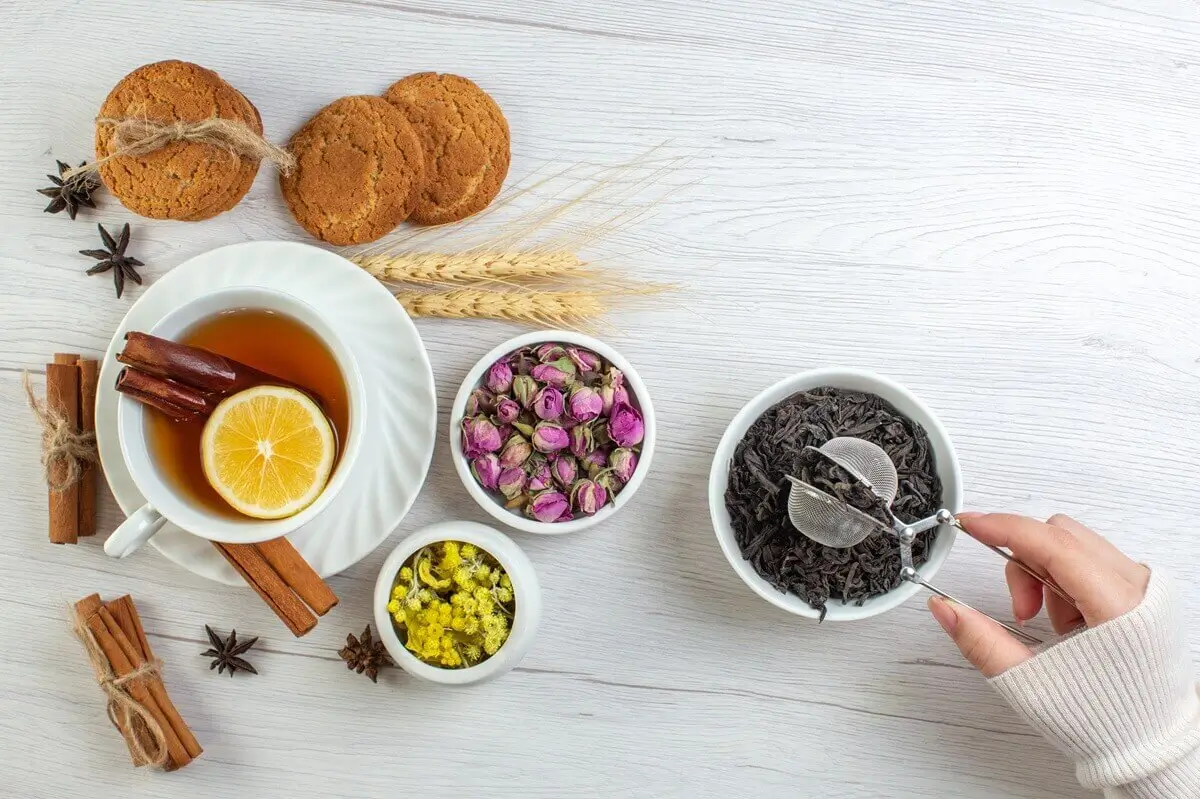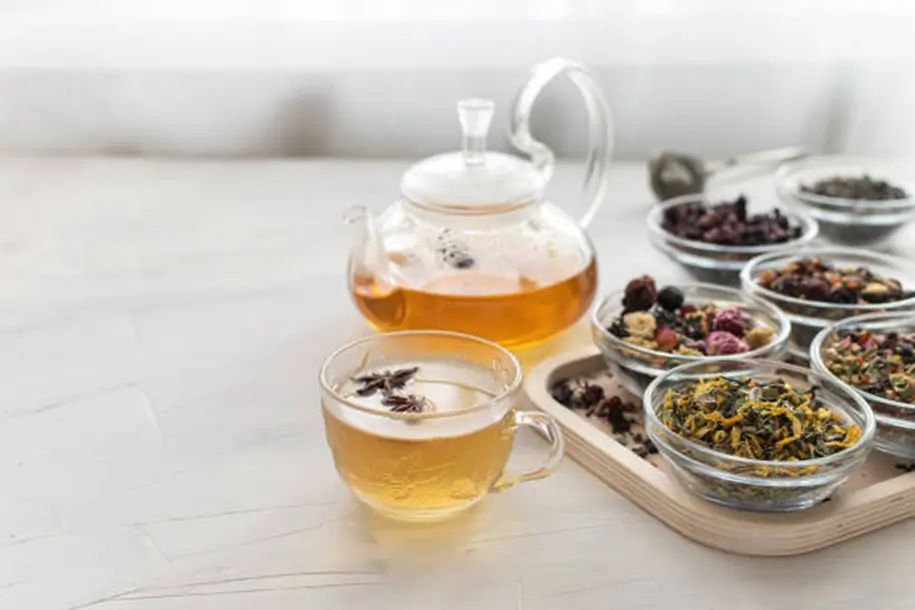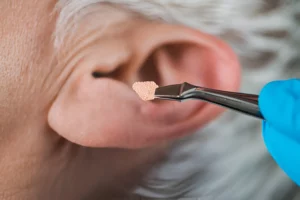Many Americans are putting down the double-espresso mocha latte and exploring the extraordinary world of tea. Asian cultures realized its value centuries ago, and U.S. consumers are now finally catching on. Tea is being rediscovered as the miracle drink that others have revered for years.
As the healthiest beverage in the world after water, tea offers numerous benefits that can significantly contribute to a change in your lifestyle and consciousness, resulting in a healthier way of life. This affects the way you eat and the foods you consume. People who drink four to six cups of tea a day are unlikely to continue consuming foods high in fat and calories.
How Does Tea Help with Weight Loss?
Weight loss tea isn’t a magic solution for losing weight, but it can support your efforts when used in conjunction with healthy habits. Just swapping out your usual high-calorie drinks – like a sugary latte – for a simple cup of tea with lemon can save you a lot of calories each day. That small change alone can make a real difference over time.
Some teas have natural ingredients called catechins, which may help your body burn fat a little faster. There’s also caffeine in many teas for weight loss, and that can slightly increase how much energy your body uses, helping you burn a few more calories. These two things together can give your metabolism a small boost.
While weight loss tea won’t melt the pounds away by itself, it might help you keep the weight off by slowing down the drop in metabolism that often happens after weight loss.
What Science Says About Tea and Weight Loss
Some research shows that tea might do more than just warm you up – it could also help with weight loss. One reason is that tea contains natural plant compounds called catechins. These may support metabolism by helping your body break down fat faster and burn more calories throughout the day. According to research, catechins also have strong antioxidant properties.
Catechins are antioxidants found in high amounts in tea, especially green tea. There are four main types: epicatechin (EC), epigallocatechin (EGC), epicatechin gallate (ECG), and epigallocatechin gallate (EGCG). Among them, EGCG is the most plentiful and has the strongest effect on the body.
Tea can also be used in conjunction with moxibustion and herbal medicine in Brooklyn, NY for even better results. Be sure to consult your practitioner first, before choosing any additional herbs. Tui Na Massage in Brooklyn can provide additional relaxation to help your body get more benefits from herbs and tea.
1. Green Tea
Green tea for weight loss can help with weight loss thanks to its rich supply of EGCG and caffeine. These two compounds may work together to support fat breakdown and slightly boost calorie burning. EGCG might also help prevent the formation of new fat cells and improve how the body handles fat. To get these effects, green tea for weight loss is usually consumed freshly brewed – ideally 2 to 3 cups a day. It’s best not to add sugar or creamers, as they reduce its benefits. People sensitive to caffeine should be cautious, as drinking too much can cause jitters, trouble sleeping, or upset stomach. Also, green slimming tea may interfere with iron absorption, so it’s better not to drink it with meals.
2. Oolong Tea
Oolong tea has a flavor that’s stronger than green tea but gentler than black, and it falls right in the middle when it comes to how it’s processed. It contains a mix of natural compounds – like catechins and theaflavins – as well as caffeine, which may help your body burn fat and manage how it uses fats for energy. Some studies show it might help with weight loss, especially in people with extra weight. To make it, just steep the loose leaves in hot (not boiling) water for a few minutes. Drinking 2 to 4 cups a day could be useful. Since it has caffeine, it might make some people feel jittery or interfere with sleep if taken late or on an empty stomach.
3. Black Tea
Black tea for weight loss goes through more oxidation than other types, which gives it a bold taste and changes what’s in the leaves. While it doesn’t have as much EGCG as green tea, it has lots of theaflavins – natural compounds that might help with weight control. Some studies show black tea could help people gain less weight and slim down a bit by making it harder for the body to absorb fat and carbs. It might also improve gut bacteria in a way that supports a healthy weight. You can make it by steeping a tea bag or loose leaves in hot water for a few minutes. Up to 3 cups a day is usually fine, but the caffeine can cause jitteriness or mess with sleep for some people.
4. White Tea
White tea is the most natural of all teas since it goes through the least processing. That means it keeps more of its helpful plant compounds, especially EGCG. Some early lab research suggests white tea might help break down fat cells and even stop new ones from forming. But so far, this has only been tested in test tubes, so we don’t know yet how well it works in real life. White tea has a soft, light taste and is made by steeping the leaves in hot (but not boiling) water for a few minutes. It’s usually safe to drink, though it still has a little caffeine, which might bother some people.
5. Pu’er Tea
Pu’er diet tea is a type of fermented Chinese black tea that helps with digestion and how your body handles fat. Some studies suggest that drinking it every day might help with weight loss, lower your BMI, and improve your cholesterol. It may also support blood sugar control, which is helpful if you’re trying to manage or prevent diabetes. To make it, just steep the loose leaves or a chunk of the compressed tea in hot water for a few minutes – how long depends on how strong you like it. Most people can enjoy Pu’er tea without issues, but it does have caffeine, so it might not be the best choice if you’re sensitive.
6. Matcha
Matcha is a type of powdered green tea that has lots of antioxidants and caffeine. It may help boost your metabolism, support fat burning, and flush out extra fluids, which can help with bloating. To make it, you just mix the powder into hot water after it’s been boiled, then stir it until smooth. People usually drink up to three cups a day – either before meals, after eating, or right after working out. Because matcha has caffeine, it might not be the best choice for those who are sensitive to it or have trouble sleeping. Drinking it late in the day or on an empty stomach could also upset your stomach.
7. Yerba Mate
Yerba mate with lemon is a popular drink for people trying to lose weight because it can boost metabolism and help you feel full, which may keep you from snacking too much. It also has a gentle diuretic effect, which means it can help reduce bloating and get rid of extra water in your body. To make it, just soak the leaves with a bit of lemon juice in hot water for 5 to 10 minutes, then strain it and drink. You can have it once or twice a day, usually before or between meals. Since it has caffeine, it can give you a little energy, but it might not be the best choice if you’re too sensitive to it. Drinking too much for too long might also carry some risks, so it’s best to enjoy it in moderation.
8. Rooibos Tea
Rooibos tea, also called red tea, is a caffeine-free drink that’s gentle on the body and easy to enjoy any time of day – even in the evening. It’s rich in antioxidants like catechins, which may help support your metabolism and fat burning. Some people drink it because it can slightly raise the number of calories your body burns, thanks to its mild thermogenic effect. To make it, just steep a spoonful of rooibos in boiling water for about 10 minutes. Most people can safely drink 1 to 3 cups a day. It’s usually well-tolerated, but like with any herbal tea, it’s best not to go overboard without talking to a doctor first.
9. Dandelion Tea
Dandelion herbal tea for weight loss is made from the root or leaves of the dandelion plant and is used to support gentle weight loss. It may help the body get rid of extra water, which can ease bloating, and it also helps with digestion and liver function – both important when it comes to how your body handles fat. To make it, just steep some crushed or powdered dandelion in hot water for about 10 minutes, then strain and sip it warm. You can drink it up to three times a day. Most people can enjoy it safely, but it might not be right for you if you’re allergic to similar plants or are taking meds that affect your kidneys.
10. Peppermint Tea
Peppermint tea is a popular choice for settling the stomach and feeling less bloated, which can help you feel a bit lighter. It has menthol, a natural compound that relaxes the muscles in your gut, making it easier for food to pass through and easing cramps or stomach pain. That can lead to better digestion and less discomfort. Some people also find it helps reduce hunger, which might make it easier to stick to healthy eating habits. You can make it by steeping dried or fresh peppermint leaves in hot water for a few minutes. Most people can drink it without issues, but if you have acid reflux or GERD, it might not be the best choice.
11. Ginger Tea
Ginger tea is a warm, calming drink that might help with weight loss by speeding up your metabolism, which means your body burns a few more calories than usual. It can also help with digestion – ginger can help food move through your system more easily and ease common problems like bloating, burping, nausea, and stomach aches. Having a cup before or during meals may even help prevent heartburn or indigestion. You can make it by steeping fresh ginger or powdered ginger in hot water. It’s safe for most people, but if you have ulcers or take blood thinners, check with your doctor first.
12. Hibiscus Tea
Hibiscus herbal tea for weight loss with cinnamon is a tasty way some people support their weight loss goals. It may help your body flush out extra fluids, reduce bloating, and give your metabolism a small boost – things that can make fat burning a bit easier. The cinnamon doesn’t just add flavor – it can also help your digestion and keep things moving along smoothly. To make it, steep dried hibiscus, horsetail leaves, and a cinnamon stick in boiling water for about 10 minutes, then strain it. You can drink it 3 to 4 times a day, about 30 minutes before meals. Most people can enjoy it safely, but if you have low blood pressure it’s a good idea to check with your doctor first.
13. Cinnamon Tea
Cinnamon tea for bloating and weight loss is a spicy drink that might help with weight loss by giving your metabolism a small boost and helping your body manage sugar better. Having about 3 grams of cinnamon a day could help lower body weight and BMI. It may also keep new fat cells from forming and help your body use stored fat for energy. To make it, just steep a cinnamon stick or a bit of ground cinnamon in hot water for a few minutes. Most people can enjoy it daily, but drinking too much – especially if it’s cassia cinnamon – can sometimes cause side effects like low blood sugar, mouth irritation, or issues for people on certain medications.
14. Fennel Tea
Fennel tea is made by steeping crushed fennel seeds in hot water for around 5 to 10 minutes. It can ease digestion, reduce bloating, and help with fluid retention or appetite control. The natural oils in fennel can relax the muscles in your digestive system, which helps food move more smoothly and may ease gas and discomfort. Fennel might help you feel full longer, which could make it easier to eat less throughout the day. It’s usually fine to drink once a day or when needed, but it’s not a good fit for everyone. If you’re pregnant, breastfeeding, allergic to carrots or celery, or taking hormone-sensitive medications, check with your doctor first.
15. Chamomile Tea
Chamomile tea is a soft, calming drink that people use to relax. But it may help with weight control by calming your nerves and reducing stress-related snacking. It also supports digestion, which can ease bloating and make you feel more comfortable after meals. That’s thanks to plant compounds like apigenin and flavonoids, which help relax the body and mind. Drinking chamomile with meals may help your stomach feel better, and having a cup before bed can improve sleep. To make it, just steep dried chamomile flowers or a tea bag in hot water for a few minutes. It’s safe for most people, but if you’re pregnant, allergic to ragweed, or take blood thinners, you should talk to your doctor first.
16. Lemon Tea
Lemon weight loss tea is a light, refreshing drink made by adding fresh lemon juice to hot tea or water. It may help with weight control by keeping you hydrated, supporting digestion, and slightly boosting your metabolism. The natural acids in lemon can act as a gentle diuretic, helping reduce bloating and water retention. It might also help curb your appetite, which can make it easier to avoid unnecessary snacking. You can enjoy it once or twice a day, usually before meals. It’s safe for most people, but the acidity might cause heartburn or affect your teeth if you drink a lot.
17. Oregano Tea
Oregano tea is a simple herbal drink made by steeping fresh or dried oregano leaves in hot water. It has natural compounds like carvacrol that may gently boost your metabolism and help reduce hunger, which can support weight loss when used in conjunction with a healthy lifestyle. It can also help with digestion and may help keep blood sugar levels steady. You can drink it a couple of times a day, especially after meals. Most people can enjoy it safely, but if you’re pregnant, breastfeeding, allergic to herbs like mint or basil, or taking medicine for blood sugar or blood thinning, it’s best to check with your doctor before using it.
18. Olive Tea
Olive tea is made from the leaves of the olive tree. It contains a natural compound called oleuropein, which may help your body burn fat more efficiently and manage things like blood sugar and cholesterol. Some people drink it to support weight loss and improve how their metabolism works. To make it, steep a small amount of dried olive leaves in boiling water for about five minutes, then strain and drink. It’s usually safe for most people, but if you’re pregnant, breastfeeding, have low blood pressure, or take medications for blood sugar or heart health, it’s best to ask your doctor before adding it to your routine.
What are the Herbal Tea Benefits for Weight Loss
Herbal teas offer several natural benefits that can support weight management and overall health:
- Helps burn more calories (green, oolong, or matcha tea to lose weight may give your metabolism a gentle boost).
- Reduces hunger and cravings (fennel, peppermint, and yerba mate can help you feel fuller).
- Supports digestion (ginger, chamomile, and cinnamon can ease bloating and stomach issues).
- Cuts down on water weight (dandelion, hibiscus, and lemon tea may help release extra fluids).
- Aids in fat processing (green tea to lose weight and olive leaf tea may help the body break down fat).
- Keeps blood sugar steady (cinnamon and olive natural weight loss tea may prevent spikes that lead to cravings).
- Calms emotional eating (chamomile and peppermint may reduce stress-related snacking).
- Low in calories (a smart swap for sodas or sugary drinks).
Possible Side Effects and Precautions
Herbal teas can provide many health benefits, but it’s also important to be aware of potential side effects and precautions:
- Can upset your stomach if you drink too much or on an empty stomach.
- Might cause allergies in people sensitive to herbs like mint, ragweed, or celery.
- Some teas don’t mix well with medications like blood thinners or diabetes pills.
- Could drop your blood sugar or blood pressure too low if you’re already taking medicine for it.
- Teas for losing weight with caffeine, like green or matcha, might make you feel jittery or keep you up at night.
- Lemon or peppermint weight loss herbal tea can sometimes lead to heartburn or acid reflux.
- Acidic teas that suppress appetite like lemon or hibiscus might wear down your tooth enamel over time.
- Not all herbal teas are safe during pregnancy or while breastfeeding – ask your doctor first.
Conclusion
Herbal teas for weight loss can be a simple and pleasant way to support weight loss, especially when you pair them with healthy food, regular exercise, and good sleep. Each fat burning tea offers something helpful. They won’t work overnight or replace healthy habits, but they can be a little boost to your weight loss goals. Just keep in mind that some teas might not work well with certain medications or health conditions, so it’s a good idea to pay attention to how you feel and check with a doctor if you’re unsure.
In addition to different types of tea, some people also find help through complementary practices like acupuncture in Brooklyn or acupuncture in Clifton, which can help with pain management and relaxation.
Specialized clinics like Pulse Acupuncture offer holistic treatments that can be used in conjunction with chiropractic adjustments, massage therapy in Brooklyn, and weight loss tea to create a well-rounded health improvement plan. By exploring these different treatments, you can find which therapies work best together for your health needs.
Read also:
- Can Acupuncture Help with Weight Loss?
- 12 Best Essential Oils to Relieve Anxiety and Stress
- Top 10 Traditional Chinese Medicine Herbs List
-
Marina Doktorman, M.S., L.Ac., is an experienced acupuncturist who obtained her Masters of Acupuncture from the Tri-State College of Acupuncture in New York City in 2001. During her studies, she focused on Chinese Herbology, a branch of Traditional Chinese Medicine (TCM) that utilizes herbs to complement acupuncture treatments. Marina is licensed in both New York (NY) and New Jersey (NJ) and holds a Diplomate of Acupuncture from the National Certification Commission for Acupuncture and Oriental Medicine (NCCAOM), indicating her expertise in the field.







